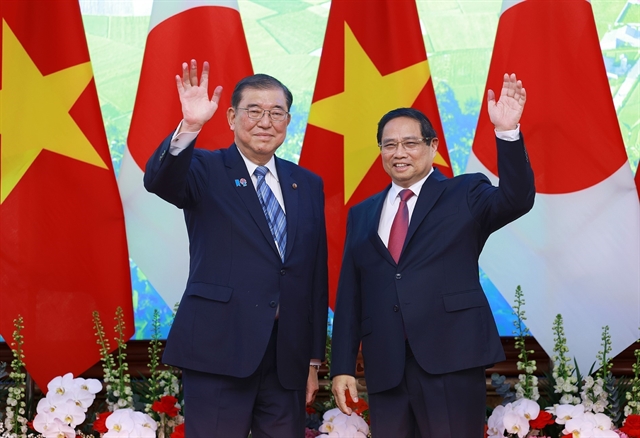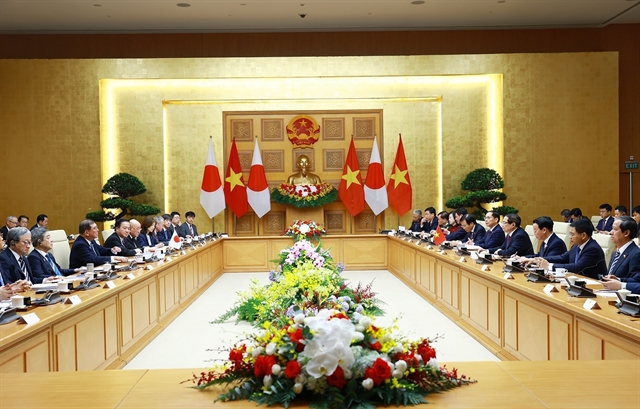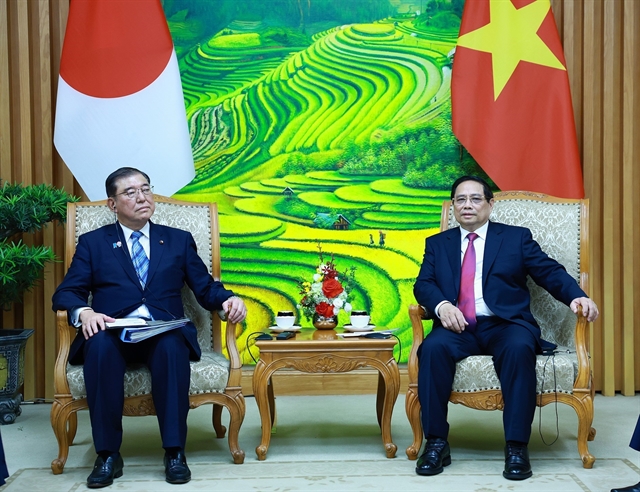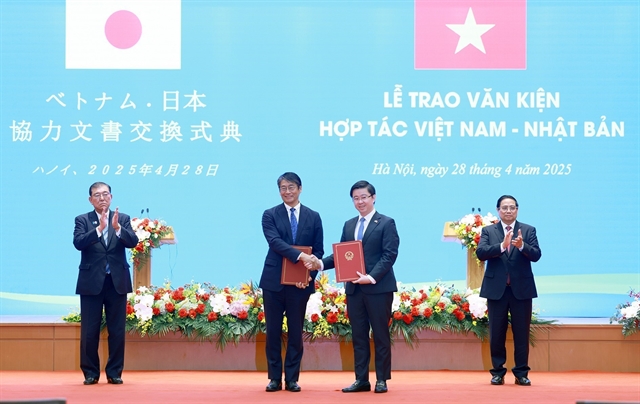 Politics & Law
Politics & Law

 |
| Vietnamese Prime Minister Phạm Minh Chính (right) and Japanese counterpart Ishiba Shigeru prior to their official talks on April 28. — VNA/VNS Photo |
HÀ NỘI — Prime Minister Phạm Minh Chính has affirmed that Việt Nam considers Japan one of its most important and trustworthy partners, and the bilateral relationship has potential for stronger cooperation based on political trust, long-standing people-to-people exchanges and complementary strengths.
PM Chính made the statement at the talks with his Japanese counterpart Ishiba Shigeru after hosting an official welcome ceremony for the latter in Hà Nội on Monday morning.
He welcomed Ishiba on his first visit to Việt Nam as Prime Minister of Japan and took this occasion to thank Japan for actively supporting Việt Nam in overcoming the consequences of recent Typhoon Yagi as well as in the fight against the COVID-19 pandemic.
For his part, PM Ishiba thanked PM Chính, the Government and people of Việt Nam for their warm and respectful reception. He believed that the leadership role of President Hồ Chí Minh with the consistent ideology of peace and humanity was the key factor for the success of Việt Nam's struggle for national liberation and reunification. He also shared his deep impressions of Việt Nam's development since his visit to Vietnam as a young parliamentarian 35 years ago.
Expressing gratitude and appreciation for the contributions of ODA loans and investment from Japanese enterprises to Việt Nam's socio-economic development in recent times, PM Chính shared solutions in the quartet of strategies to implement industrialisation and modernisation, including breakthroughs in science and technology development, implementing the revolution of streamlining the apparatus, developing the private economic sector, building an independent and self-reliant economy, associated with deep, substantive and effective integration.
PM Ishiba highly appreciated Việt Nam's position and role in the region and the world, and affirmed that Japan will continue to accompany Việt Nam in the new era, supporting Việt Nam in socio-economic development, building an independent and self-reliant economy, implementing industrialisation, modernisation, and developing science and technology.
In an atmosphere of sincerity, friendship and trust, the two leaders had in-depth and comprehensive discussions on the bilateral relations and international and regional issues of mutual concern. The two PMs expressed their delight at the comprehensive development of the Việt Nam-Japan Comprehensive Strategic Partnership after nearly two years of upgrading to a new framework, and highly appreciated the progress achieved after their two meetings in just over a year.
 |
| A view of the talks between heads of the two countries' Governments. — VNA/VNS Photo Dương Giang |
The two sides also discussed and reached many common perceptions on major directions and measures to bring the bilateral relationship to a new height, entering a new era under the motto of "sincerity, affection, trust, substance, efficiency, mutual benefit" in five areas, including political relations; economy, human resource connection; security - defence; science - technology, green transition; and cooperation at multilateral forums.
The two leaders agreed to continue to enhance political trust through maintaining annual high-level visits and meetings; promote exchanges to soon arrange the visit to Việt Nam of the Emperor and Empress of Japan; promote regular meetings between the two PMs; improve the effectiveness of cooperation and dialogue mechanisms; and strengthen substantive defence and security cooperation, including cooperation in defence technology, addressing the consequences of war, search and rescue, United Nations peacekeeping, and cyber security.
The two sides agreed to upgrade the Strategic Partnership Dialogue mechanism at the deputy foreign minister level to the 2+2 dialogue at the deputy foreign and defence minister level and hold the first meeting in 2025.
 |
| Vietnamese Prime Minister Phạm Minh Chính (right) and Japanese counterpart Ishiba Shigeru at the retreat before their official talks on April 28. — VNA/VNS Photo Dương Giang |
The two PMs agreed to deepen economic cooperation as the main pillar of the relationship and promote more substantive and sustainable economic links, thereby supporting each other to develop together in the context of the current difficult international economic situation. The two sides agreed to promote the new-generation ODA cooperation for strategic infrastructure projects, and enhance substantive, effective, and sustainable investment and trade cooperation.
Appreciating the progress achieved in a number of important projects such as Hồ Chí Minh City Urban Railway Line 1, the two sides agreed to accelerate and set specific progress for many projects that are symbolic of the bilateral relationship such as Việt Nam-Japan University and Chợ Rẫy Hospital II, as well as projects of the Việt Nam Space Center. The two sides agreed to promote high-tech agricultural cooperation associated with ensuring the food supply chain, and sign the Medium and Long-term Vision on Agricultural Cooperation for the 2025-30 period in 2025.
PM Chính affirmed that Việt Nam is determined to improve the investment and business environment to create favourable conditions for Japanese investors to continue to invest and do business successfully in the Southeast Asian country.
Based on the similarities in development strategies grounded on science and technology and digital transformation, the two leaders agreed to identify cooperation in science and technology, innovation, and training of high-quality human resources as new pillars of the bilateral relations; and agreed to promote cooperation in the fields of digital economic development, semiconductors, quantum, nuclear energy, IT, artificial intelligence, green transition, and energy transition. They also consented to improve the effectiveness of cooperation mechanisms and frameworks on science and technology through organising the 5th meeting of the Joint Committee on Science and Technology in 2026 and studying the possibility of establishing a new cooperation mechanism on science and technology in the direction of public-private partnership.
PM Chính proposed Japan continue to support Việt Nam in training high-quality human resources, strengthen cooperation between research and training institutions, scientists and businesses of the two countries; increase the provision of scholarships for Vietnamese students and researchers; support the community of 70 enterprises and 5,000 IT engineers of Việt Nam to actively participate in the IT supply chain and digital transformation process of Japan.
 |
| Vietnamese Prime Minister Phạm Minh Chính (right) and Japanese counterpart Ishiba Shigeru witnessed the signing ceremony of the Memorandum of Understanding on cooperation between the Ministry of Science and Technology of Việt Nam and the Ministry of Education, Culture, Sports, Science and Technology of Japan on research and development cooperation in the field of semiconductors. — VNA/VNS Photo Dương Giang |
PM Ishiba affirmed that Japan will support joint research projects and doctoral training in semiconductors in Việt Nam through the Japan-ASEAN Science, Technology and Innovation Cooperation Project (NEXUS). He announced that Japan wants to implement 15 projects in the field of energy transition worth more than US$20 billion within the framework of the Asian Energy Transition Initiative (AETI) and the Asian Net Zero Emission Community (AZEC).
The two PMs agreed to promote cooperation in responding to natural disasters and climate change, connecting human resources through labour cooperation, local cooperation, cultural exchange, and people-to-people exchange; actively coordinate to organise the Việt Nam - Japan local forum in Vietnam at the end of 2025; promote cooperation and share experiences in promoting tourism and traditional culture.
To create favourable conditions for the Vietnamese community in Japan, the two sides agreed to start negotiations on the Việt Nam - Japan Social Insurance Agreement in 2025 and promote the development of a Memorandum of Understanding on cooperation on the new labour programme "employment for skills development".
PM Ishiba highly appreciated the contributions and affirmed that he would continue to care for, support, and create conditions for the community of more than 600,000 Vietnamese people in Japan. The two sides agreed to continue discussing the simplification of procedures and the expansion of visas issued for Vietnamese citizens, aiming to achieve the target of 2 million tourists visiting each other per year.
Discussing regional and international issues, the two leaders agreed to continue to closely coordinate in international and regional forums such as ASEAN, Mekong and the United Nations. The two sides affirmed the importance of maintaining international order and a free, open, inclusive, rules-based trade system, on the basis of respect for the fundamental principles of international law and the United Nations Charter. They also asserted the importance of maintaining peace, stability and resolving disputes in the East Sea (internationally known as the South China Sea) by peaceful means, on the basis of international law, especially the 1982 United Nations Convention on the Law of the Sea (UNCLOS), the Declaration on the Conduct of Parties in the East Sea (DOC), and early completion of an effective and efficient Code of Conduct in the East Sea (COC).
PM Ishiba affirmed that Japan will closely coordinate and support Việt Nam in successfully organising the APEC Year 2027 and actively consider sending a representative of the Japanese Government to attend the 16th United Nations Conference on Trade and Development (UNCTAD) Ministerial Meeting to be held in Hà Nội in 2025.
PM Chính thanked Japan for its active participation in the 4th Partnership for Green Growth and the Global Development Goals 2030 (P4G) Summit, and announced that Việt Nam will send a delegation to attend the Việt Nam Day activities at the Osaka Kansai International Exhibition 2025.
Signed agreements
After the talks, the two PMs witnessed the handover ceremony of important cooperation documents between ministries, branches and agencies of the two countries. Specifically:




